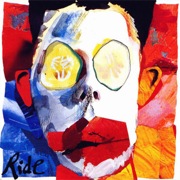In the liner notes interview conducted for the Going Blank Again reissue, bass player Steve Queralt recalls Ride’s thinking before recording the album: “We’d done the noise thing to death. We were starting completely afresh, and we were totally free to do what we liked.”
It’s a good preface for the album: their debut, 1990’s Nowhere, a nigh on perfectly-formed classic residing in the poppier end of the shoegaze spectrum, had given the band their fair share of acclaim, and now they could do what they would. The end result of hugely productive studio sessions with Alan Moulder behind the desk was the sound of an ambitious band forging a sonically diverse record, tied together by songwriters Mark Gardener and Andy Bell’s knack with a good tune, now given the remastering sheen and reissued with that interview and a DVD of their March 1992 Brixton Academy set.
In the end, the band may have done themselves a disservice by putting up front the finest product of those sessions, brilliant opener ‘Leave Them All Behind’. And how brilliant it is: it might be easy to see that opening organ figure, giving way to Queralt and drummer Loz Colbert’s strident interlock and followed by the incision of the guitars, melting across the stereoscope, as part of the era’s well-worn quiet/loud trope. But it’s far more than the simple off/on thump of a distortion pedal; rather, it’s a wave that surges forward, loping at first, gathering pace and then crushing everything in its path. From that Who-like inflection at the start to the rinse of acoustic guitars over the fleeting middle eight’s descending chords, the track is, as Moulder says of the band in the liner notes, “a classic case of the parts being greater than the individuals”.
The album’s opening tracks weirdly follow the same pattern as on Nowhere. There, the piledriver opener ‘Seagull’ gave way to the jaunty, Byrdsian pop of ‘Kaleidoscope’, just as Going Blank Again’s behemothic lead-off is followed by ‘Twisterella’. The track is fine – a jangling, three-minute power-pop single – but it also underwhelms, both following the opener and on its own, and the feeling lingers that Kevin Shields meshed harmonic pop with distorted grind far more successfully four years earlier on My Bloody Valentine’s ‘Thorn’.
This inconsistency soon emerges as the album’s calling card. Joe Clay, who conducted the liner notes interview, points up in his Quietus feature on the album the fact that Going Blank Again was initially going to be a double album, though the band’s US label, Sire/Warner Brothers, suggested/enforced a reining in. The album consequently has an exciting, condensed feel, though one whose miscellany only rewards sporadically: the glorious heft of the opener and ‘Cool Your Boots’ sits alongside other cuts in the ‘Twisterella’ vein, throwaway flotsam like ‘Mouse Trap’ and ‘Making Judy Smile’, an ill-conceived Kinks pastiche.
The band jettisoned MBV-esque flux and atonality (which does make a welcome appearance on bonus track ‘Stampede’), in favour of songs working in a more traditional structure, even if they are frequently knitted together from the double album’s offcuts, such as the vignette intros of ‘Time Machine’ and ‘OX4’.
Other flashes of greatness on the album come on the lush strings boiling beneath the shining acoustic guitars on ‘Chrome Waves’, a ballad whose weight is conversely undermined by the lightweight, wasted lyrics, intoning “I’ll meet you on the way down / Can’t stay – unbearable to go”. The mostly-instrumental jam of ‘Time Machine’ reflects how in-sync the band had become from touring Nowhere: the popping guitar riff that cycles through the song is overdubbed with Bell’s perfectly expressive, restrained acoustic lines.
The concert DVD, too, easily puts over how tautly the band meshed together live. The filming itself is a prime slice of the 90s – there are some great spinning, out of focus camera shots and an unhealthy dose of slow motion – but the band are a powerhouse, translating the record’s crashing waves of sound into a visceral, wiry performance, storming through material from the album and some well-chosen earlier cuts like ‘Taste’ and ‘Nowhere’.
The four bonus tracks, taken from the ‘Leave Them All Behind’ and ‘Twisterella’ EPs, are also brilliant inclusions. The tonal distance between the first of them, ‘Going Blank Again’, and the end of the album proper ‘OX4’, is huge: though the closer’s disco-like offbeat, pinning down a poppy 12-string riff starts out well, it gets weighed down by repetition, while the EP track cuts loose with crystalline guitars and ricocheting drums. ‘Grasshopper’ is the best of the quartet, a sprawling instrumental that tops the 10-minute mark and revels in Mogwai-esque ‘serious’ guitars and Colbert’s furious yet precise drums.
Perhaps without meaning to, Going Blank Again makes clear that Ride were a precedent for the best aspects of Britpop – the songs’ anthemic nature, their assured self-confidence and adept musicality – crystallising something that would become cheapened and tarnished by the worst excesses of singalong lad culture a comfortable few years before the movement would emerge.
What the album lacks is Nowhere’s more frequent seismic moments; ‘Leave Them All Behind’ is a match for ‘Dreams Burn Down’ and ‘Vapour Trail’, but little else is. Going Blank Again is, though, good enough to stand alone. It’s the sound of an immensely talented band producing something that strides atop the era’s slew of hand-wringing Nevermind soundalikes, instead positively drawing on its influences to craft something singular. What unfurls is an album that, if marred by inconsistency, reveals enough greatness to make it an essential revisit.


